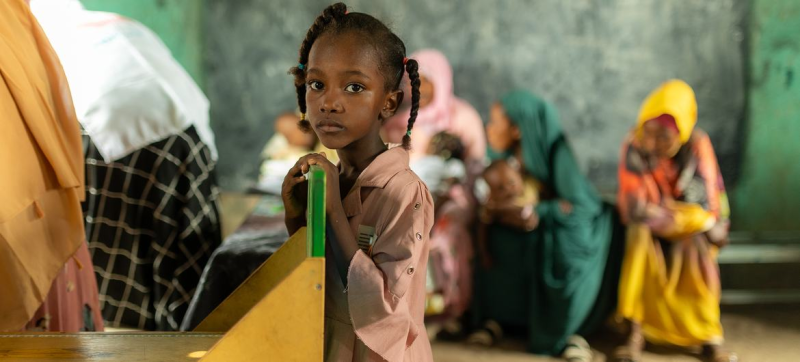- Sharif Osman Hadi No More |
- Tarique Rahman to Return Home With Daughter on Dec 25 |
- ILO praises Bangladesh’s labour reforms, new milestones |
- Depositors stranded as Sammilito Islami Bank is in liquidity crisis |
- BNP faces uphill task to reach seat-sharing deal with allies |
UN Warns of Starvation and ‘Gender Emergency’ in Sudan

Children receive health and nutrition services at a UNICEF-supported centre in Umshouka, Sudan.
Hungry civilians in war-torn Sudan are reportedly eating animal feed as women and girls face a “gender emergency,” UN officials warned on Thursday.
Particularly hard hit is El Fasher, where hunger is growing. The Office for the Coordination of Humanitarian Affairs (OCHA) has warned of a worsening crisis that is putting more civilians’ lives at risk.
OCHA’s Director of Operations and Advocacy, Edem Wosornu, currently in Sudan, said the suffering is immense, with people trapped, displaced, or returning to communities in ruins. She called for unimpeded access and urgent support to reach those on the frontlines of hardship.
At a UN press briefing in New York, Deputy Spokesperson Farhan Haq said, “With increasingly alarming food shortages and spiralling prices, people in El Fasher are reported to be resorting to eating animal feed in what is an increasingly catastrophic situation.”
El Fasher has the highest cost of basic goods nationwide — nearly $1,000 per household per month — far beyond the reach of most families. This includes over $700 for food alone, more than eight times the cost in other parts of Sudan.
“These steep costs, coupled with the siege and lack of aid delivery by road for over a year, have left thousands facing starvation,” Haq said, stressing that calls by the Secretary-General and the UN Emergency Relief Coordinator for a humanitarian pause are “more important than ever.”
To curb public health risks in North Darfur, UN humanitarian partners and local authorities launched a sanitation campaign on 5 August targeting 11,000 people in El Fasher and Dar As Salam, aiming to prevent disease outbreaks in overcrowded displacement sites during the rainy season.
They are also scaling up efforts to respond to a cholera outbreak in Tawila, which has received 330,000 displaced people fleeing conflict in Zamzam and El Fasher since April. In Blue Nile State, cholera cases have surged to nearly 2,800 since late June, with over 40 new infections recorded yesterday alone. Fourteen deaths have been reported.
The UN gender equality agency, UN Women, has raised the alarm over the crisis facing women and girls.
“This crisis is a gender emergency,” said Salvator Nkurunziza, the agency’s representative in Sudan. “Displaced women and girls face risks of exploitation and abuse, especially during aid delivery, where protection mechanisms are weak or absent in some areas.”
According to Sudan’s Unit for Combating Violence Against Women, as of March 2025, there have been 1,138 recorded cases of rape since April 2023, including 193 involving children, most in conflict-affected areas.
“The actual number may be higher, as fear of stigma and other social or security concerns prevent accurate reporting,” Nkurunziza warned.
He added that gender-based violence can prevent women and girls from accessing food assistance, and that female-headed households — already three times more likely to be food insecure — are now the hungriest group in Sudan.
“Women are central to household survival, especially in displacement settings, but their ability to access food is deeply compromised,” he said.

